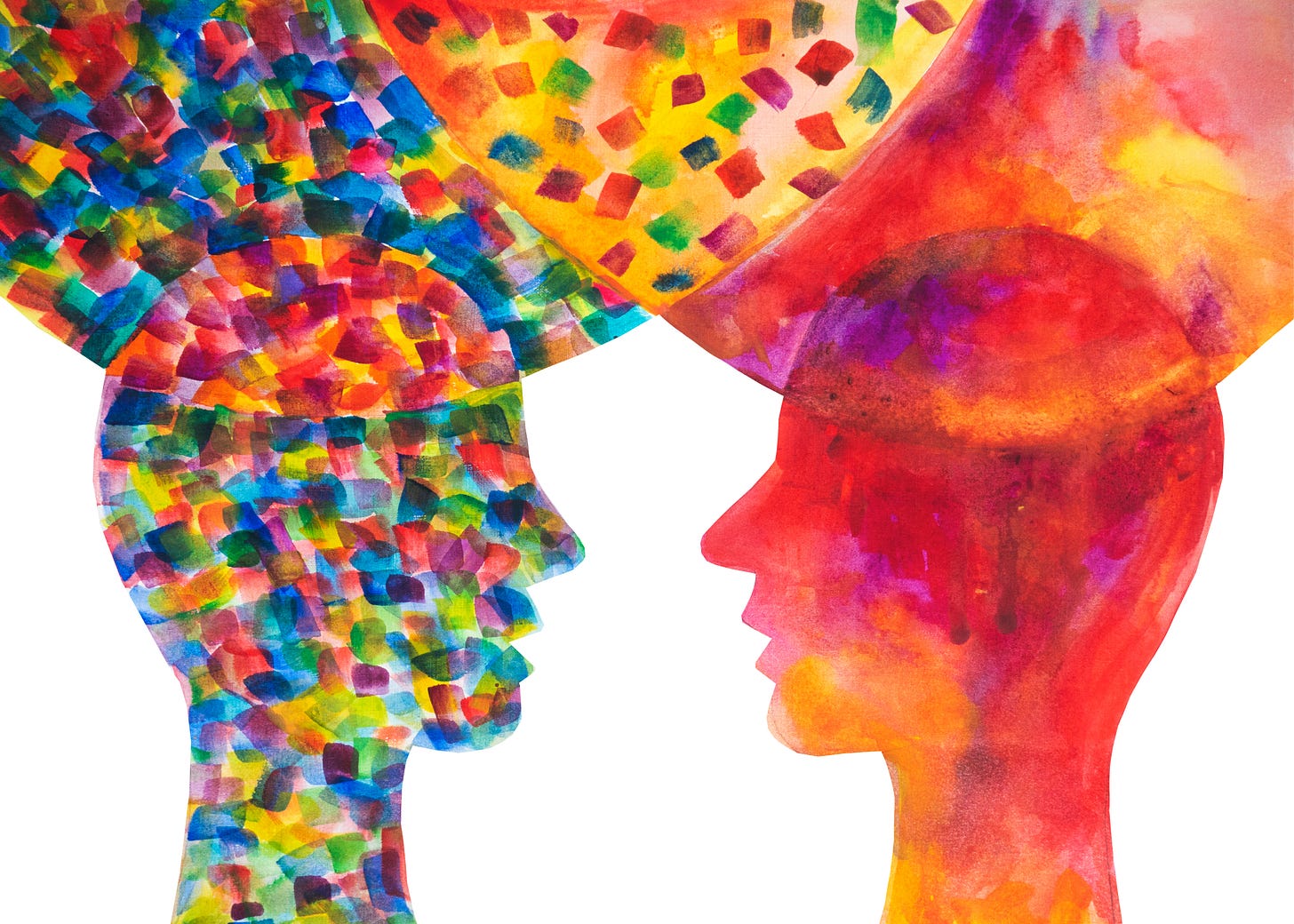“Humble yourself before the Lord and he will exalt you.” – James 4:10
Here I am in the middle of my lifespan, and I’m deeply disappointed with how overconfidence in my own common sense has so often failed me.
Like many Americans, I was permanently changed by the death of George Floyd in 2020. As I watched the footage of him crying for his mom while a cold-eyed police officer kneeled on his neck, the dabbling I’d been doing in researching America’s history with racism took on an urgency. As the parent of an Ethiopian-American daughter, I could no longer ignore the cries of the black community for equity and justice. Then, of course, came the smelling salts of Breonna Taylor, Ahmaud Arbery, and many others. Eventually, I consumed so many details surrounding the circumstances of their deaths, and the legal injustices involved, that I became incensed by the police in general. I began to eye officers with suspicion everywhere I went, prepared to whip out my phone and collect evidence of abuse if the situation demanded it. I was creating enemies for myself. My heart grew cold and, though I failed to recognize it, I was being distanced from an important piece of my humanity.
One evening my family shared a meal with a local police officer and his family, in his home. I knew enough about him to know he was a tender-hearted human being with a deep commitment to serving his community, on and off duty. As he hosted us with grace and care, I listened as he told us some of his stories from his work in our area. My cold heart began to warm as I brought attention to the face of a white police officer who exuded gentleness, patience, and hope for humanity, even as he carried deep sorrow for the horrors he faced daily while on duty.
I walked away from that encounter changed…again.
Dualistic thinking is incredibly tempting because of its efficiency. We can only handle so much cognitive load before we become completely overwhelmed.
Every day, we are bombarded with sensory input which, if we were “awake” to all of it, would render us incapacitated in a corner somewhere. Our brains do us a big favor by quickly sorting all our experiences into neat categories so we can efficiently navigate the information-pandemonium that is human existence. And the crazy part is that we’re not even aware our nifty brains are doing this at all! Unfortunately, the price we pay for this efficiency is binary bias, which is distorted thinking that reduces things on a spectrum down to two categories.
Good and bad.
Right and wrong.
Or, if we want to take an example from the Bible, clean and unclean.
I could go on, but you get it.
We take concepts that are nuanced, complex, and multi-layered and we reduce them down so that we don’t have to do the heavy lifting of gathering all the information, listening to all sides, synthesizing opposing ideas, and formulating a comprehensive opinion.
That’s just too much work, most of the time, and so we’re left with little recourse but to slap labels like common sense, plain truth, and obvious choice on beliefs and opinions that are really nothing more than black-and-white thinking at its finest.
Researcher and organizational psychologist Adam Grant proposes that the antidote to this kind of binary bias is to complexify our thinking. Instead of dismissing complex stories, ideas, and people, we need to acknowledge the complexity and showcase the range of perspectives. This effectively disrupts what Grant calls the biggest enemy to good thinking – the overconfidence cycle – and spurs, instead, rethinking cycles. According to Grant, the overconfidence cycle includes movement back-and-forth between pride, conviction, confirmation and desirability bias, and validation.
As Christians, this cycle should strike us as thoroughly unsatisfactory, as it perpetuates idolatrous self-referencing and rigid intellectual dishonesty. Yet, it’s insidious because it doesn’t feel bad or dangerous to us when we’re experiencing this cycle. In fact, the overconfidence cycle feels good, right, and superior. Why should we complexify things when we’re so sure we’re right? Even more curious is how we complexify things after we’ve been so self-assured for so long, buoyed by our in-group thinking and lack of outside information? And here’s an even more disturbing consideration: if we’re not seeing things clearly because we’re stuck in overconfidence cycles, how do we know if we’re seeing God’s character and work clearly? Are we certain God and God’s people fit inside our carefully constructed categories?
From where I’m standing, as a middle-aged woman who has lived a lot of life in 43 years, the answer to that last question is no.
I am less confident in my biased categories than I’ve ever been. The longer I live, the more I come to understand that situations, stories, and people are rarely what they seem at first.
Take my opening story, for example. I once scoffed at the idea of institutional racism. This was theory-induced blindness, according to researcher Daniel Kahneman, in his best-selling and insightful book, Thinking, Fast and Slow:
“…once you have accepted a theory and used it as a tool in your thinking, it is extraordinarily difficult to notice its flaws. If you come upon an observation that does not seem to fit the model, you assume that there must be a perfectly good explanation that you are somehow missing.”
Fortunately, a few stories caught my attention and gave me pause. Curious by nature, I read some books which piqued my interest in learning more about our country’s history with racism, and my eyes were slowly opened to a world about which I had been ignorant. Mass incarceration, school-to-jail pipelines, redlining, political manipulation and broken promises, the creation of an entire caste system – these things and more I eventually could not deny. There were too many receipts. My binary bias was shattered.
Then, 2020 happened and my trusty brain decided it was all too much, and the best thing to do was default to black-and-white thinking to spare me from the cognitive dissonance that always rises when we refuse to dehumanize anyone. My binary bias was back – police were suspicious, maybe even dangerous. These new categories helped me feel confident to handle the craziness all around me. I now had a clear enemy.
Then, I had dinner with a tender-hearted policeman who told me his stories, which shattered my new binary bias. He didn’t fit my categories. I realized I had been trapped in the overconfidence cycle again, moving back and forth between pride and confirmation bias, I’d missed the nuance of the narrative, the humanity in the characters of the story.
“The confidence that individuals have in their beliefs depends mostly on the quality of the story they can tell about what they see, even if they see little.” – Daniel Kahneman, Thinking, Fast and Slow
Refusing to dehumanize anyone, while holding tension between two opposing ideas is a mighty uncomfortable position, not mention exhausting at times. Yet, if we want to be exalted above the overconfidence cycle which leads to faulty (and lazy) thinking, we must be humble enough to stretch. And we stretch by listening deeply to others.
What are their concerns? What do they see that I don’t? What have they experienced that I haven’t? What can they teach me? What are all the sides to the story?
As we stretch to receive what others have to offer, our perspectives expand and even strengthen. Listening to others doesn’t mean we take on their perspectives or lose our own way. When I left that tender-hearted police officer’s home, I still believed in institutional racism and stood against incentivized policing and all forms of brutality. As I processed our time together, though, I was able to see some things I’d been missing. This rethinking cycle restored me to myself, as I let go of the bias that had been helping me create an enemy in my heart.
“When we choose to wonder about people we don’t know, when we imagine their lives and listen for their stories, we begin to expand the circle of those we see as part of us.” – Valerie Kaur
This mid-life disenchantment-with-everything is revealing how often I’ve reduced situations, stories, and even people down to silly binaries, just so I didn’t have to wrestle in the tension of multiple perspectives. Yet, this long, loving look at the real in myself is inviting me to wonder, to deeper listening, to an eyes-wide-open kind of life that feels truer and better.
It’s a sort of dying that leads to living, which is precisely the invitation Jesus is always offering (Matt 16:25). An invitation to die to pride, confirmation bias, dehumanizing others, and creating false separations between me and them. It’s also an invitation to live, in wholeness and integration, within myself and with the beloved human beings who walk this earth with me.
Perhaps you need to stretch too, dear one? Maybe there’s a story you need to hear, or a perspective you need to see? What stirs up resistance or hesitation in you? There’s nothing to fear by taking a long, loving look at the real.
“We need joy as we need air. We need love as we need water. We need each other as we need the earth we share.” – Maya Angelou








The good news is ... the bad news didn’t work out!!
Our God is so faithful and so very patient with His children. He so lovingly sits beside us, carrying us when necessary and giving us time to work things out in our heads and our hearts. Just exactly the way He designed our natural heads and hearts to do. His ways are Devine and supernatural. It is WRITTEN, if we seek HIM, take time with HIM the way HE takes time with us it all works out. He shows up for us. We must make it our business to show up for Him.
I SO relate to what you share, and hear you, Amber! 🫶🏽 Truly, to be good humans. To be “fit” as people in relationships, we need to stretch ourselves! What a valuable reminder!